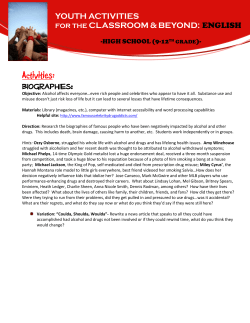
ACCESSIBILITY in Adult Learning AWARD
ACCESSIBILITY in Adult Learning AWARD In parallel to the EAEA Grundtvig award and in the framework of the Adult Education Made Accessible project (AEMA), an additional award has been launched by the European Association for the Education of adults: the Accessibility Award. Background Comparative data shows that people with disabilities1 are the group with the lowest rates of participation in post and upper secondary educational settings, with the evident consequences on employment. Also the EU Action Plan on Adult Learning sees people with disabilities as one of the most disadvantaged groups in terms of their low participation in adult education. We are all aware that access to adult education is a key factor for inclusion. Therefore, obstacles and barriers that hinder the accessibility to adult education should be tackled. The AEMA network aims to do so by adopting a comprehensive approach and sharing information on characteristics of and preconditions for accessibility – an “Accessibility Framework” – that takes into consideration accessibility from a holistic perspective, which addresses both the needs of people with diverse impairments and the situation in adult education provision. Information on the call If you have been implementing projects and initiatives which contribute to increase the accessibility of adult education in Europe, you are invited to apply to the award! Who can participate? Nominations may be made for any service or department within adult education providing courses to people with disabilities aged 16 and over, who have demonstrated excellent examples of practice to meet the needs of a learner or learners with a disability. Why participate? All participants gain: The Award participation certificate ; International visibility in EAEA’s social media channels and EAEA website. The winner gains: Fame and honour; The certificate of attendance; An invitation to a person of the winning organisation to the EAEA General Assembly 2015 in Porto, Portugal (22/23 June 2015) and the EAEA Grundtvig Award Ceremony including travel and accommodation; 1 People with disability may be described as anyone who has a physical, psychological, mental, cognitive, sensory, neurological or degenerative impairment which affects their ability to function. In cooperation with International visibility of the project in EAEA’s social media channels and EAEA website also after the ceremony; Appearance in EAEA’s press-release after the competition. Criteria: The criteria for which the project will be evaluated are divided into five sections described in the annex. What do we expect? Please fill in the form below with the following information: 1. A description of the project: The main goals of the project and how it promotes accessibility; Which tools did you develop; What you actually did and how you did it; Your target group(s); What processes or partnerships were important; How did you get people involved? 2. Explanation about the impact should be provided filling the annex. You may submit a description of your project in one of the following languages: English, French and German to francesca.operti@eaea.org . Entries must be received by sending the general description of the project and filling in the form (annex1) until Sunday, 3 May 2015. If you have any printed or similar (DVDs etc.) evidence, please send it also to: European Association for the Education of Adults (EAEA) To the attention of Ms Francesca Operti Mundo-J Rue de l’Industrie 10 B-1000 Bruxelles The project The AEMA-Network consists of twelve organisations from eleven European Countries. It aims at contributing to an increased participation rate of people with disabilities in Adult Education; increasing the number of Adult Education providers who make a publicly visible commitment to increasing Accessibility in their own organisations; and developing sustainable national and European networks committed in moving the Accessibility Agenda further. More information at: http://www.aemanet.eu/ Anna Schachner, queraum. cultural and social research, schachner [at] queraum.org In cooperation with
© Copyright 2025









